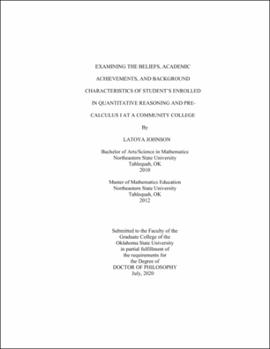| dc.contributor.advisor | Utley, Juliana | |
| dc.contributor.author | Johnson, Latoya | |
| dc.date.accessioned | 2021-02-22T22:24:06Z | |
| dc.date.available | 2021-02-22T22:24:06Z | |
| dc.date.issued | 2020-07 | |
| dc.identifier.uri | https://hdl.handle.net/11244/328610 | |
| dc.description.abstract | College Algebra has been the main credit bearing mathematics course for many college students, but only one in five students at the community college level were passing this course. Students that did not have a mathematics dependent major seen College Algebra as a gatekeeper for completing college. With several students struggling to complete College Algebra, new mathematical pathways were created that gave students the option to take other courses such as Quantitative Reasoning in order to fulfill their college mathematics credit. | |
| dc.description.abstract | The Midwestern College, where this study took place, chose to incorporate a new QR course for students. With the incorporation of this new course, it is important for instructors to know who are now in these classes in order to develop interesting and relatable material, thus this study examined 230 participants demographics, achievement, and belief characteristics in both QR and Pre-Calculus I (i.e., College Algebra). The study also looked at any differences in characteristics between the two groups as well as differences between students that were successful and unsuccessful in each course. Last, the study look at the combination of characteristics that could predict student's success (final curse grade) in each course. | |
| dc.description.abstract | University records provided high school GPA and ACT mathematics and composite scores, while a face-to-face self-reporting survey was used to gather data on demographics, mathematics identity, grit, mathematics attitudes, anxiety, and self-efficacy. This dissertation presents the findings from the data collected. | |
| dc.description.abstract | The findings from this study indicate that demographics for the two courses are similar, but Pre-calculus I (PC-I) students had a significantly higher ACT composite and mathematics score, identity score, and effectance motivation. Additionally, the study found that females were more successful than males in PC-I and students that successfully complete QR had a higher consistency of interest. A binary logistics regression indicated that consistency of interest and the usefulness of mathematics were predictors of success for students in the QR course. High school GPA, gender, and self-efficacy were predictors of success for the students in the PC-I course. This insight will help instructors to develop activities and curriculum to aid in the success of students. | |
| dc.format | application/pdf | |
| dc.language | en_US | |
| dc.rights | Copyright is held by the author who has granted the Oklahoma State University Library the non-exclusive right to share this material in its institutional repository. Contact Digital Library Services at lib-dls@okstate.edu or 405-744-9161 for the permission policy on the use, reproduction or distribution of this material. | |
| dc.title | Examining the beliefs, academic achievements, and background characteristics of students enrolled in Quantitative Reasoning and Pre-Calculus I at a community college | |
| dc.contributor.committeeMember | Cribbs, Jennifer | |
| dc.contributor.committeeMember | Redmond-Sanogo, Adrienne | |
| dc.contributor.committeeMember | McCann, Mindy | |
| osu.filename | Johnson_okstate_0664D_16858.pdf | |
| osu.accesstype | Open Access | |
| dc.type.genre | Dissertation | |
| dc.type.material | Text | |
| dc.subject.keywords | achievement | |
| dc.subject.keywords | beliefs | |
| dc.subject.keywords | college algebra | |
| dc.subject.keywords | mathematics attitudes | |
| dc.subject.keywords | pre-calculus i | |
| dc.subject.keywords | quantitative reasoning | |
| thesis.degree.discipline | Mathematics Education | |
| thesis.degree.grantor | Oklahoma State University | |
